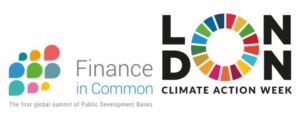Webinar | How can development banks accelerate the green financial and budgetary transition
- By : Louise KESSLER, PhD / Sébastien POSTIC, PhdFinance in Common Summit and London Climate Action week Side-event
The climate emergency, and the commitments of countries to support the objectives of the Paris Agreement have highlighted the need, in the very short term, to increase and reorient public and private funding towards the sectors necessary for the low-carbon transition, while reducing the flow of unfavorable climate finance.
Although these projects are implemented by a wide range of project promoters, governments, financial institutions, and especially public development banks, have an essential role to play. However, even the magnitude of their task is difficult to estimate: the volumes and complexity of finance flows make it difficult to assess the current situation of financing flows, and of the gap that needs to be bridged to achieve carbon neutrality.
I4CE, the Climate Policy Initiative (CPI) and Public development banks such as the French Agency for Development (AFD), the Inter-American Development Bank (BID) have launched several initiatives aimed at assessing the level of progress of countries with regard to the low-carbon transition, with the aim of supporting the scale-up of investments and expenditure needed to achieve national emissions reductions objectives.
Some of the tools that can be mobilized by development banks, such as climate investments landscapes, green budgeting, and PEFA Climate will be discussed in the first half of this webinar ; in the second half, the French Development Agency, the Inter-American Development Bank and GIZ will provide insights as to how these tools can be mobilized to accelerate the green financial and budgetary transition.
Programm
16h30-16h35: Welcome & Introduction I4CE and AFD
16h35-17h10: Part 1: Short presentations on the relevant tools that are being developed
Panel discussants:
- I4CE – Sebastien Postic
- Climate Policy Initiative – Baysa Naran
- PEFA Climate – Guillaume Brule
17h10- 17h50: Part 2: Panel discussion: implementation and prospects
How can these tools be mobilized by development banks to i) accelerate public action: and ii) reorient funding flows ?
Panel discussants:
- AFD – Nicolas Lecrivain
- IADB – Raul Delgado
- GIZ – Ursula Stiegler
17h50-18h00: Conclusion
Finance in Common Summit and London Climate Action week Side-event


